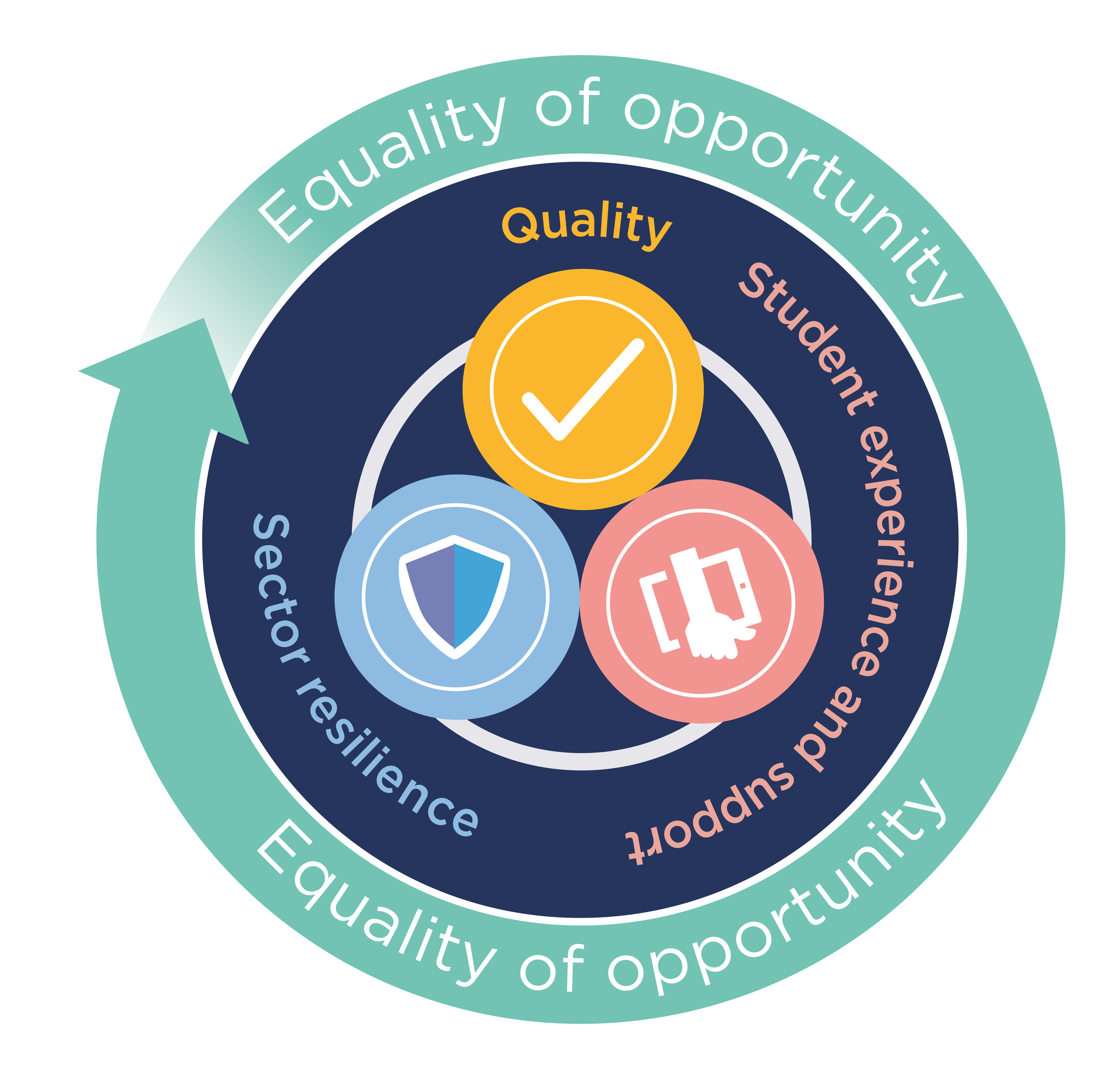The OfS strategy roadmap: 2025 to 2030
Our strategic goals
Goals are grouped into three areas:
- quality
- student experience and support
- sector resilience
Equality of opportunity is interwoven throughout everything that we do.

Quality
Students assume their higher education will be high quality, and most provision in the higher education sector in England is already excellent. But where quality falls short, the risks to students are significant.
Student surveys consistently find that a significant minority of students are dissatisfied with core parts of their academic experiences, and while student outcomes are strong in aggregate, examples of poor continuation and completion rates can be identified across different modes and levels of study, in different subject areas, and for students with different characteristics.
Looking to the future, digital technology and artificial intelligence will precipitate potentially transformative shifts in teaching, learning and assessment, accentuated by a demand for lifelong learning and the changing skills needs of the economy. These changes will create opportunities to exploit, but also challenges to navigate, as we seek to ensure that universities and colleges can play their full role as drivers of growth.
Where provision is already high quality, we know that many institutions want to improve further. As they embark on improvement, they will face headwinds and difficult decisions. We will work with the institutions we regulate to promote high quality education for all students in the face of countervailing pressures.
|
|
Building on the Teaching Excellence Framework (TEF), we will develop an integrated approach to quality assessment that drives continuous improvement across the higher education sector, benefiting more students at a greater number of institutions. We will do this in collaboration with students, institutions and sector experts. Where necessary, we will pursue investigation and enforcement, using the full range of our powers to protect students from provision that falls below the requirements set out in our conditions of registration. |
|
|
Equality will remain central to our approach to regulating quality. Quality assessments will continue to hold institutions to account for the experiences and outcomes of students from disadvantaged backgrounds and groups underrepresented in higher education. |
|
|
We will protect and promote freedom of speech and academic freedom, including by reporting on the outcomes of free speech complaints, supporting institutions to safeguard the robust exchange of ideas that provides essential underpinning for a high quality education. |
|
|
We will celebrate and share examples of excellence wherever we find them, helping institutions to learn from what works well, and communicate openly about the risks to quality we identify. |
|
|
Guided by a deeper understanding of the factors that shape students’ decision making, we will support informed choice by ensuring timely access to clear, reliable information. We will be particularly concerned to ensure that students from disadvantaged backgrounds and underrepresented groups have the information they need to make decisions that work for them. |
|
|
We will continue to work with institutions to extend the benefits of higher education to more students, whatever their background and wherever they live. We will expect institutions to leverage regional partnerships in the development and execution of evidence-led plans that support students with the ability and desire to access, succeed in, and progress from higher education. |
|
|
We will regulate in a way that allows higher education to play a central role as a driver of economic growth, supporting an environment conducive to innovation in the interests of students. We will deliver our core regulatory functions in a timely and rigorous way and work with Skills England to assess the extent to which higher education options align with national and regional skills needs. |

Student experience and support
Higher education should be a rich, rewarding environment, extending beyond lectures, labs and assessments. Feeling part of a community that supports their learning and their wellbeing, and values their voice, is part of what enables many students to thrive.
While most students have high quality experiences, not all students benefit in the ways they expect. Unclear or unfair contractual terms, extra charges and misleading information can compromise students’ experiences of, and ability to engage in, higher education. Factors such as the rising cost of living and increased reporting of mental health conditions, meanwhile, suggest that the student experience is becoming more challenging. The effect of these challenges falls disproportionately on those with fewer economic and social resources to draw on in response.
Institutions should be innovative and bold in their work to deliver positive student experiences. We acknowledge, however, that the sector’s response to these issues needs to be considered in the context of constrained finances, wider pressures on public services and the diverse needs and priorities of the students different institutions teach. We will deploy non-regulatory approaches where issues that matter to students supplement our regulatory scope, working collaboratively to support institutions in meeting students’ needs.
|
|
We will gather and analyse data and insights from students, institutions and others to improve our understanding of the extent to which students’ reasonable expectations are being met in relation to their academic experiences and the support they receive. |
|
|
We will empower students to understand and more effectively exercise their rights as consumers, while also promoting greater awareness among institutions of their obligations to students under consumer law. |
|
|
We will strengthen our regulatory requirements to better protect students from unfair treatment and work with government to secure the powers we need to further champion students’ interests. |
|
|
A strengthened understanding of students’ experiences and concerns will underpin all our activity. We will seek students’ perspectives to develop our understanding of the changing barriers they face as they seek to make the most of their education, and share what we learn with institutions, government, media and other stakeholders. |
|
|
We will continue to work with institutions to reduce risks to equality of opportunity, recognising that the overall experience of higher education is becoming more challenging and many of those challenges are particularly acute for certain student groups. We will expect institutions to develop and execute evidence-led plans to support students from all backgrounds and to evaluate the impact of their interventions. |
|
|
We will highlight areas of concern or interest that may not be subject to direct regulation but which students tell us matter to them, enabling institutions and others to respond proactively, and share examples of what’s working well. We will seek to enhance institutions’ capacity and capability to meet students’ needs by working with sector agencies and other partners. |
|
|
We will regulate to prevent harassment and sexual misconduct in higher education and to ensure that institutions respond effectively when incidents occur. |

Sector resilience
A resilient higher education sector is essential to delivering high quality education and maintaining meaningful student choice, as well as ensuring long-term value for students and the public.
Many institutions are facing financial challenges and may need to consider major changes to their operating models to prevent financial risks from crystalising. The decline in the real-terms value of income from UK students and increased reliance on fee income from international students, together with inflationary and economic pressures, have created complex challenges for institutions to navigate that are unlikely to abate in the short term.
As risk in the operating environment increases, institutions will need different capabilities to manage the challenging circumstances they face. We will ensure that institutions seeking registration are equipped to navigate these circumstances, alongside strengthening our focus on good governance more broadly, recognising that effective leadership is essential to the responsible stewardship of public funding in the interests of students and taxpayers.
|
|
We will maintain an up-to-date assessment of financial risk at both institution and sector level, informed by predictive and lead indicators. We will improve our approach to data collection and look for opportunities to reduce the number of data requests we make, while continuing to obtain the information we need. |
|
|
We will communicate our conclusions as appropriate, helping institutions to understand their own position while also supporting a shared view of the sector’s financial health and other aspects of performance. We will challenge institutions where we have concerns that they may not have credible plans in place to manage the financial risks they face. |
|
|
We will work with institutions to improve planning for potential closures, normalising conversations about preparedness. We will require institutions facing a material risk of closure to have credible and deliverable plans to minimise disruption for students and we will continue to work with government to address the gaps in the system that mean that students cannot be adequately protected if their institution can no longer operate. |
|
|
We will monitor and communicate the impact of financial pressures on student choice, as institutions make difficult decisions about the size and shape of their provision. As part of this, we will identify potential risks to the supply of critical skills at a regional and national level. |
|
|
We will strengthen our oversight of governance to ensure institutions are accountable and public funding is used appropriately. We will concentrate monitoring and compliance activity where risks to students and taxpayers are most acute. |
|
|
We will ensure that tests for institutions seeking registration effectively identify those not yet ready to enter the regulated system, and that our regulation of established institutions can facilitate swift action wherever management and governance issues arise. |
|
|
We will work with institutions and sector agencies to identify and address barriers to strengthened governance more broadly. We will consider an enhanced focus on good governance as a means of ensuring that institutions effectively discharge their responsibilities to students, including in relation to the issues that students tell us matter most to them. Should institutions fail to strengthen their governance sufficiently, we will consider regulatory intervention. |
|
|
We will increase the regulatory requirements placed on institutions engaged in significant partnership activity and consider further changes should other forms of high-risk activity emerge. We will continue to work with the Department for Education and Student Loans Company (SLC) to mitigate risks to SLC funding where possible and work with government on legislative solutions that would stop the flow of public money where we have concerns about its intended use. |

Describe your experience of using this website




